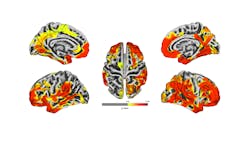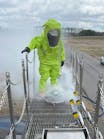Studies: WTC First Responders at Risk for Dementia
Source Firehouse.com News
Two new studies led by Stony Brook University researchers have found that World Trade Center first responders show a higher risk for developing Alzheimer's disease or related dementias.
In addition to the heightened cancer risk for those who spent time at Ground Zero after the 9/11 terror attacks, which continues to claim the lives of firefighters with FDNY and other responding agencies, these new studies reveal WTC responders with signs of cognitive impairment (CI) are showing neuroradiological abnormalities and changes in their blood similar to dementia patients.
One study published in Alzheimer’s and Dementia: Diagnosis, Assessment and Disease Monitoring shows that many responders with CI have reduced gray matter thickness in the brain consistent with neurodegenerative conditions and evidence that their brain "age" is about 10 years older than the population average.
The other study, which will be published in Translational Psychiatry, reveals that some responders who are suffering through post-traumatic stress disorder (PTSD) and mild CI posses protein changes in their blood consistent with Alzheimer's disease.
“The environmental exposures and psychological pressures experienced by responders during 9/11 and its aftermath has had an insidious effect on their health and well-being,” says Benjamin Luft, MD, Director of the Stony Brook WTC Health and Wellness Program.
“Now nearly 20 years post-9/11, clinicians who care for these individuals are seeing more patients who are showing signs of cognitive disorders and possible dementia," Luft adds. "Findings from our new studies provide data for the first time that support the idea that this population of patients who have cognitive impairment not only have psychological problems such as PTSD but may be at high-risk for neurodegenerative disorders, a possibility that needs immediate and continued investigation.”
One of the studies is the first to use MRI imaging to assess the brain matter of World Trade Center responders with and without symptoms of CI. The goal was to determine if those in their midlife have developed CI due to neurotoxin exposure at Ground Zero. The ages of patients was from 45 to 65 years, a range where cortical atrophy is rare in the normal population.
The other study analyzed 276 proteins in the blood of 181 male WTC responders with an average age of 55 years.
The studies were supported by the National Institute for Safety and Occupational Health (NIOSH) and the National Institute on Aging.






